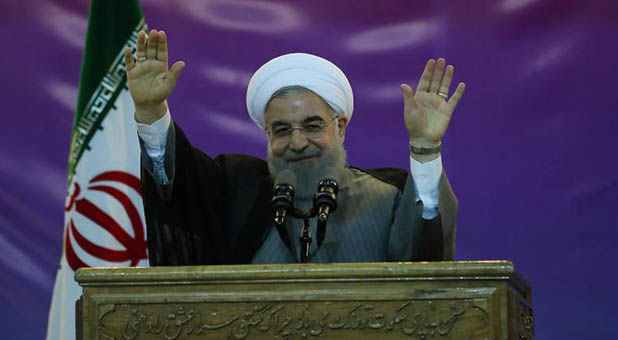Fresh Off His Landslide Victory, Iran’s President Thumbs His Nose at the U.S.
Fresh off his re-election, Iranian President Hassan Rouhani said the Islamic Republic will continue missile tests “if technically necessary.”
“Our missiles are for our defense and for peace, they are not offensive. Know that while there is a technical need to conduct missile tests, we will do so and we will ask the permission of no one,” Rouhani told reporters in Tehran.
Rouhani’s statement comes as President Donald Trump, who just finished a visit to Saudi Arabia and is currently visiting Israel, slammed Iran as a “state sponsor of terrorism” during his meeting with Israeli President Reuven Rivlin in Jerusalem.
“Most importantly, the United States and Israel can declare with one voice that Iran must never be allowed to possess a nuclear weapon—never, ever—and must cease its deadly funding, training and equipping of terrorists and militias, and it must cease immediately,” Trump told reporters.
Trump, who arrived in Jerusalem after visiting Saudi Arabia, told the Israeli president he was encouraged by the conversations he had with Muslim leaders.
“Many expressed their resolve to help end terrorism and the spread of radicalization. Many Muslim nations have already taken steps to begin following through on this commitment,” he said, adding, “There is a growing realization among your Arab neighbors that they have common cause with you in the threat posed by Iran.”
Trump said Saudi Arabia’s King Salman would “love to see peace between Israel and the Palestinians.”
Rivlin said there must be “trust and cooperation” between Israelis and Palestinians.
“Our destiny—Palestinians and Jews—is to live together in this land, Mr. President. We must build trust and cooperation between us,” he said.
Rouhani won Iran’s election decisively Friday, with 57 percent of the vote over hardline conservative challenger Ebrahim Raisi’s 38.5 percent. Voter turnout was unexpectedly high, with 70 percent of Iranian constituents casting ballots.
His landslide re-election is viewed as a significant endorsement of his initiatives to re-engage with the international community—including the 2015 nuclear deal with world powers—and offer Iranians greater domestic liberties, contrasting with Raisi’s platform of religious conservatism and a return to an isolationist foreign policy.
“Our nation’s message in the election was clear: Iran’s nation chose the path of interaction with the world, away from violence and extremism,” Rouhani said in a televised address following his victory.
Prior to the election, Iran’s conservative faction had united behind Raisi, a protégé of Supreme Leader Ayatollah Ali Khamenei. Raisi’s defeat leaves the country’s conservatives without clear leadership.
Rouhani’s sweeping victory protects the nuclear deal brokered with former President Barack Obama and other Western leaders and grants the country’s reformists greater political influence over the selection of Iran’s next supreme leader.
This article is a combination of several articles originally published at JNS.org. Used with permission.
















































